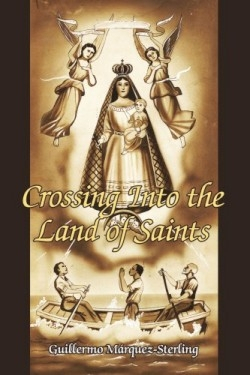Crossing Into the Land of Saints
“‘God has not answered our prayers and we’re all dying strangers in a strange land.’” So runs the lament of an exiled matriarch named Cheita whose dying wish to be buried in rural Cuba powers this novel of family social context and limitations on free will. Her coffin is as essential to this fiction as others were to Larry McMurtry’s Lonesome Dove and Faulkner’s As I Lay Dying.
Roli Lopez-Zayas is a Boston-raised twenty-something born of immigrant parents. He moves to Miami in time to see the media circus around Elián Gonzáles. Roli achieves an inside/outside perspective on the inherited culture; he remains affectionate but critical. The anti-Castro exiles aren’t monolithic in politics but -isms continue to cause hard feelings. The folly of political difference hits Roli during a sub-radar run to Cuba from the Keys: “Why do we allow our ideologies to get in the way of each other? Ideologies didn’t John Lennon say we should get rid of them?”
The fairly dysfunctional family is a gold mine for Roli’s uncle who never runs out of socially inappropriate quips. His obliviousness to everyone’s discomfort will remind readers of someone they know. Footnoted Spanish phrases are incorporated into the dialogue including colorful invectives of marvelous variation regarding excrement-eating and the procreative act. The English language has no corner on catchy blue slang.
The author’s Miami mothers are hair-triggered hysterics who must be told lies to ensure peace. Roli’s big sister Alina shocks the folks by voting for Bill Clinton and surprises herself with an attachment to the infant son of two troubled crack addicts. She constantly pushes sniping loved ones backward to keep enough space to live. Alina is forced to tell her mother “‘I will decide what dreams I want to pursue. I will decide which of your hand-me-down-dreams I will keep.’” The American-born generation walks to the beats of two disparate communities interested in hammering out amalgamated self-images.
The book is sharply divided into the Florida-set first section and the second set in rural Cuba and on turbulent waters between. The decaying home country is rendered with authoritative texture. Young Americans abroad rediscover roots and evolve watching honorable confederates choose loyalty to others over safety from a repressive government regime. The Roman Catholics there are also fervent supplicants to a Santeria icon known as La Virgen de la Caridad. The two story halves are so different in tone that it takes a sympathetic stretch to see them as a single narrative.
The author a United Church of Christ minister is a grandson of Dr. Carlos Marquez Sterling the scholar and candidate for the Cuban presidency in 1958. Crossing Into the Land of Saints relocates bonds which hold even in the era of disposable association. A dose of suspense and a candleflame of wonder enhance this story of tradition departure progress and return.
Disclosure: This article is not an endorsement, but a review. The publisher of this book provided free copies of the book and paid a small fee to have their book reviewed by a professional reviewer. Foreword Reviews and Clarion Reviews make no guarantee that the publisher will receive a positive review. Foreword Magazine, Inc. is disclosing this in accordance with the Federal Trade Commission’s 16 CFR, Part 255.

